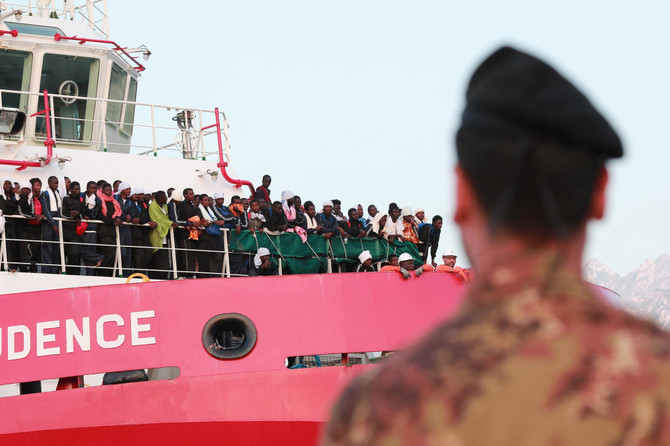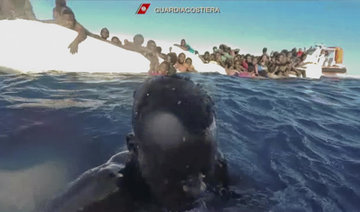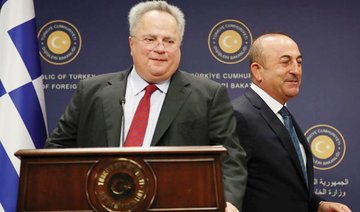LONDON: The flow of migrants into Europe shows no signs of abating, say experts with the number of asylum seekers increasing in some countries and many living in dire conditions as they wait for their applications to be processed.
While Germany saw a decline in the number of refugee applications in 2017, France witnessed the highest number of asylum applications in 40 years during 2017 and anticipates a further rise this year.
Pascal Brice, director general of the French Office for the Protection of Refugees and Stateless Persons (Ofpra) told French broadcaster CNEWS that the number of asylum applicants in the country had increased by 17 percent, with more than 100,000 requests registered last year.
“France is one of the top countries for seeking asylum in Europe” after Germany, which expects to receive just under 200,000 requests for asylum in 2018,” Brice said.
Brice noted a sharp rise in the number of requests from Albanian and West African nationals with 7,630 applications from Albania and 5,987 from Afghanistan — the second most common country of origin.
Speaking to Arab News, professor Christian Dustmann, director of the Center for Research and Analysis on Migration (CReaM) said: “The political fallout has been quite tremendous in Europe so clearly European countries have tried to make sure that the influx of asylum seekers will be reduced.”
“That has seen some success so things have calmed down a little bit but in the longer run this will not totally abate.”
Neil Grungas, executive director of the organization for Refuge, Asylum & Migration (Oram) pointed to “signs of instability” elsewhere in the region, including the recent uprising in Iran and the possibility of further crackdown on protesters by the regime. “We don’t yet know what will be the impact in terms of outflow from Iran.”
“Also, the fact that ISIL (Daesh) has been apparently quelled in some sections of Syria and in Iraq doesn’t mean they are gone. We can expect the kind of radicalism and the kind of political pressures that we’ve seen to carry on further and further.”
“People will need to leave…some because they are living in war zones and others because they are tired of living in situations of perpetual displacement,” he added.
“There is a lot of political instability in the Middle East so I don’t see that this will now disappear completely, I think we will live with this challenge for a very long time to come,” Dustmann said.
A series of regime air strikes in rebel-held Idlib in Syria on Sunday, which killed at least 40 people, sent thousands fleeing north toward the Syrian border.
Kerem Kinik, president of the Turkish Red Crescent Society, told Arab News earlier this week that in the past fortnight around 64,000 Syrians have traveled from the south of Idlib toward the north.
“We are doing our best to accommodate them in our camp between Idlib and our southern border,” he said.
A report released by The UN Refugee Agency (UNHCR) in March 2017 found that counties bordering Syria hosted the vast majority of refugees, with more than 5 million people seeking refuge in Turkey, Lebanon and Jordan, as well as Egypt and Iraq.
The controversial deal struck between the EU and Turkey last year, which left many refugees stranded on Greek islands, was designed to stem the flow of migrants crossing into Europe but relations between the signatories have since deteriorated.
The EU’s deal with Turkey is “beginning to fray around the edges” said Jonathan Portes, professor of economics and public policy at King’s College London, and a senior fellow of the UK in a Changing Europe program.
“It’s quite possible that you will continue to have very large numbers of people displaced from Syria to Jordan, Turkey, Lebanon and that many of those will continue to try and make their way to Europe if they see that as being a potentially feasible thing to do.”
For those trying to cross into Europe, the journey has grown increasingly difficult and perilous since more countries closed off migration routes.
“Even if applications are going up in France, there’s still quite a strong cohort of people in Calais who are in the dire conditions because there is no official camp and there are more and more restrictions on what services can be provided for them,” said Fizza Qureshi, Director of the Migrants’ Rights Network.
“For us the concern is there are no easy routes for protection, so a lot of people are having to put themselves into the hands of traffickers.”
“Its incredibly difficult for people who end up in places like Hungary and some of the other Eastern European countries that are very unwelcoming at the moment to refugees.”
“There needs to be a much more rights-based approach to refugee protection.”
Europe refugees flows set to continue amid sharp rise in asylum applications
Europe refugees flows set to continue amid sharp rise in asylum applications

US and Mideast countries seek Kyiv's drone expertise as Russia-Ukraine talks put on ice

KYIV, Ukraine: The United States and its allies in the Middle East are seeking Ukraine's expertise in countering Iran's Shahed drones, according to Ukrainian President Volodymyr Zelenskyy.
Various countries, including the United States, have approached Ukraine for help in defending against the Iranian drones, Zelenskyy said late Wednesday. He said he has spoken in recent days with the leaders of the United Arab Emirates, Qatar, Bahrain, Jordan and Kuwait about possible cooperation.
Russia has fired tens of thousands of Shaheds at Ukraine since it invaded its neighbor just over four years ago, launching a swarm of more than 800 drones and decoys in its biggest nighttime barrage. Iran has responded to joint U.S.-Israeli strikes by launching the same type of drones at countries in the Middle East.
Ukrainian assistance in countering Iranian drones will be provided only if it does not weaken Ukraine's own defenses, and if it adds leverage to Kyiv's diplomatic efforts to stop the Russian invasion, according to the Ukrainian leader.
"We help to defend from war those who help us, Ukraine, bring a just end to the war" with Russia, Zelenskyy said. Later Thursday, Zelenskyy said he had received a U.S. request for support to defend against the drones in the Middle East and had given the order for equipment to be provided along with Ukrainian experts without providing further details.
"Ukraine helps partners who help our security and the protection of our people's lives," he added in a social media post.
Trump, in an interview Thursday with Reuters, said, "Certainly I'll take, you know, any assistance from any country."
Ukraine has battle-tested drone defenses
Ukraine has pioneered the development of cut-price drone killers that cost as little as $1,000, rewriting the air defense rule book and making other countries take notice.
European countries got a wake-up call last September on the changed nature of air defense when Poland scrambled multimillion-dollar military assets, including F-35 and F-16 fighter jets and Black Hawk helicopters, in response to airspace violations by cheap drones.
Ukrainian manufacturers have developed low-cost interceptor drones specifically designed to hunt and destroy Shaheds, and its rapidly expanding drone industry is producing excess capacity.
Zelenskyy announced earlier this year that Ukraine would begin exporting the battle-tested systems.
The European Union's top diplomat, Kaja Kallas, said before chairing a meeting of EU and Gulf foreign ministers via video link Thursday that the talks would look at how Ukraine's experience can help countries counter Iranian drones.
Middle East war delays Russia-Ukraine talks
The Iran war, now in its sixth day, has drawn international attention away from Europe's biggest conflict since World War II, and forced the postponement of a new round of U. S-brokered talks between Russia and Ukraine planned for this week, Zelenskyy said.
Western governments and analysts say the Russia-Ukraine war has killed hundreds of thousands of people, while there is no sign that yearlong U.S.-led peace efforts will stop the fighting any time soon.
"Right now, because of the situation around Iran, there are not yet the necessary signals for a trilateral meeting," Zelenskyy said. "But as soon as the security situation and the overall political context allow us to resume that trilateral diplomatic work, it will be done."
Zelenskyy thanked the United States for the return from Russia on Thursday of 200 Ukrainian prisoners of war. Russia's Defense Ministry also said it received the same number of prisoners from Ukraine and thanked the U.S. and United Arab Emirates for mediating.
Prisoner swaps have been one of the few tangible results of the talks. Vladimir Medinsky, a Russian negotiator, said on social media that a total of 500 prisoners from each side would be exchanged between Thursday and Friday.
Oleksandr Merezhko, the head of Ukraine's parliamentary foreign affairs committee, said Russian President Vladimir Putin is trying to drag out the negotiations so that he can press on with Russia's invasion while escaping further U.S. sanctions.
He urged the U.S. administration to look at the Russia-Ukraine war and the war in the Middle East as linked.
"In reality, Russia and Iran are close allies that act in concert — Iran supplies weapons and Russia helps Iran develop its defense industry. These are interconnected conflicts," Merezhko told The Associated Press.
Ukraine's army has recently pushed back Russian forces at some points along the roughly 1,250-kilometer (750-mile) front line, according to the Institute for the Study of War.
Localized Ukrainian counterattacks liberated more territory than Ukrainian forces lost in the last two weeks of February, the Washington-based think tank said this week, estimating the recovered land at about 257 square kilometers (100 square miles) since Jan. 1.












